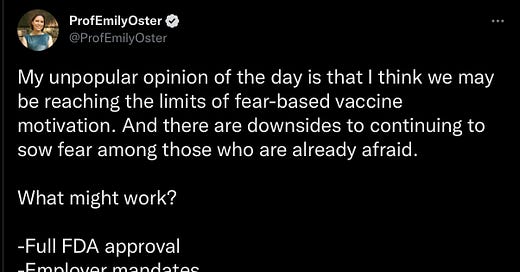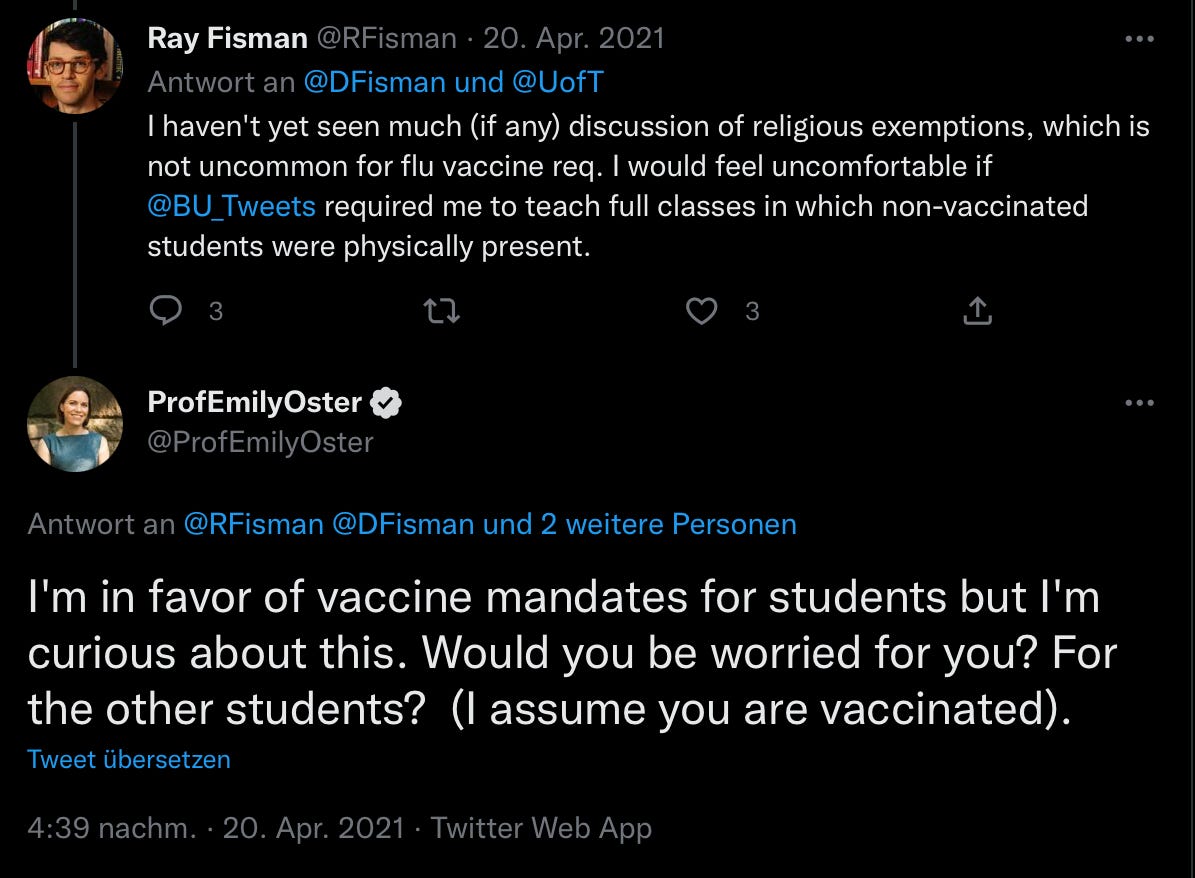Emily Oster proposes “a pandemic amnesty,” suggests that “we need to forgive one another for what we did and said when we were in the dark about COVID”
I don’t know much about the American pandemic pundits, but I gather that Brown University economist and “parenting guru” Emily Oster is far from the worst of them. Her Twitter timeline suggests she spent the early months of the pandemic terrified about the virus until school closures took their toll on her kids, at which point she repositioned herself as a kind of lockdown moderate, opposing the worst of the hystericist excesses while validating their central premises whenever possible to save face with friends and colleagues.
Emily Oster’s latest act of moderation is the suggestion that we forgive and forget all the disastrous policies inflicted on us by terrified wealthy urbanites, clueless technocrats and mad scientist vaccinators since 2020, because, hey, these were just honest mistakes, anybody could’ve messed up like that, it’s all good.
April 2020, with nothing else to do, my family took an enormous number of hikes. We all wore cloth masks that I had made myself. We had a family hand signal, which the person in the front would use if someone was approaching on the trail and we needed to put on our masks. Once, when another child got too close to my then-4-year-old son on a bridge, he yelled at her “SOCIAL DISTANCING!”
These precautions were totally misguided. In April 2020, no one got the coronavirus from passing someone else hiking. Outdoor transmission was vanishingly rare. Our cloth masks made out of old bandanas wouldn’t have done anything, anyway. But the thing is: We didn’t know.
The thing is, Emily Oster, that we did know. We’ve studied respiratory virus transmission for years. All the virologists and epidemiologists who aren’t total morons knew your 2020 mask routine was crazy and they just didn’t care. They wanted you to do it anyway, because they thought that if they got you to act paranoid and antisocial enough, your insane behaviour might have some limited effect on case curves. Joke’s on you, and it’s sad you still haven’t realised.
[T]here is an emerging (if not universal) consensus that schools in the U.S. were closed for too long: The health risks of in-school spread were relatively low, whereas the costs to students’ well-being and educational progress were high. The latest figures on learning loss are alarming. But in spring and summer 2020, we had only glimmers of information. Reasonable people—people who cared about children and teachers—advocated on both sides of the reopening debate. …
No, reasonable people could see already in March 2020 that SARS-2 posed no measurable threat to children. There was never any honest debate to be had about this.
The people who got it right, for whatever reason, may want to gloat. Those who got it wrong, for whatever reason, may feel defensive and retrench into a position that doesn’t accord with the facts. …
We have to put these fights aside and declare a pandemic amnesty. … [W]e need to learn from our mistakes and then let them go. We need to forgive the attacks, too. Because I thought schools should reopen and argued that kids as a group were not at high risk, I was called a “teacher killer” and a “génocidaire.” It wasn’t pleasant, but feelings were high. And I certainly don’t need to dissect and rehash that time for the rest of my days.
Moving on is crucial now, because the pandemic created many problems that we still need to solve.
I’m sorry somebody called you genocidal, Emily Oster. That must’ve been tough for you. You know what’s also tough? Getting your head kicked in by riot police because you had the temerity to protest against indefinite population-wide house arrest.
Or being fired from your university job and banned in perpetuity from the premises because you uploaded a video to social media complaining about the onerous and expensive testing requirements imposed upon unvaccinated staff. Or being confined to your house and threatened with fines because of personal medical decisions that had no chance of impacting the broader course of the pandemic in the first place. But somebody called this woman genocidal in French and she’s ready to move on, so it’s all good.
Emily Oster may have said a few reasonable things in the depths of her pandemic moderation, but she can take her proposal for pandemic amnesty and shove it all the way up her ass. I’m never going to forget what these villains did to me and my friends. It is just hard to put into words how infuriating it is, to read this breezy triviliasation of the absolute hell we’ve been through, penned by some comfortable and clueless Ivy League mommyconomist who is ready to mouth support for basically any pandemic policy that doesn’t directly affect her or her family and then plead that the horrible behaviour and policies supported by her entire social milieu are just down to ignorance about the virus. We knew everything we needed to know about SARS-2 already in February 2020. The pandemicists and their supporters crossed many bright red lines in their eradicationist zeal and ruined untold millions of lives. That doesn’t all just go away now.







My favorite quote: "It is just hard to put into words how infuriating it is, to read this breezy triviliasation of the absolute hell we’ve been through, penned by some comfortable and clueless Ivy League mommyconomist who is ready to mouth support for basically any pandemic policy that doesn’t directly affect her or her family and then plead that the horrible behaviour and policies supported by her entire social milieu are just down to ignorance about the virus. We knew everything we needed to know about SARS-2 already in February 2020. The pandemicists and their supporters crossed many bright red lines in their eradicationist zeal and ruined untold millions of lives. That doesn’t all just go away now."
Her proposal is fatuous. Forgiveness at this point is begging for endless repeats of the last three years.